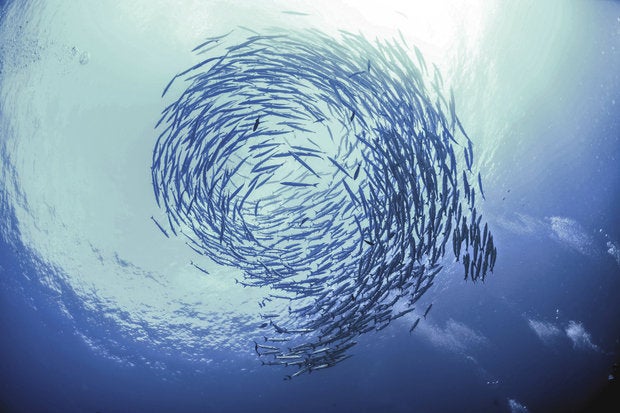
Hawkins / Freude
Inhaltsverzeichnis: (verbergen)
 |
|
|
|
Die US-amerikanische Unabhängigkeitserklärung erwähnt an prominenter Stelle das Recht auf das Streben nach Glück als unveräußerliches Menschenrecht.
Glück und Freude treten aus Inneren hervor. Sie können weder erkauft noch erzwungen werden – von außen.
Der Wiener Psychoanalytiker Sigmund Freud [BW 499] erachtete das Volk der Deutschen als unbegabt für Glück. Glück liegt jenseits der schwierig zu über-
In den 60er Jahren fand der US-amerikanische materialistisch-humanistische Psychologe Abraham Maslow [BW 475] in seiner Glücksstudie heraus: "Es gibt nur 5% wahrhaft glückliche Menschen auf der Erde."
1954 veröffentlichte er die Ergebnisse der von ihm entwickelten berühmten
Ohne das Transzendente und Transpersonale werden wir krank, ge- walttätig und nihilistisch oder verlieren die Hoffnung und werden apa- thisch. Wir brauchen etwas, das größer ist als wir selbst, das wir ver- ehren und dem wir uns hingeben können. Abraham Maslow [BW 475] (1908-1970) US-amerikanischer transpersonaler Psychologe, Glücksforscher |
Die Quintessenz der internationalen Glücksforschung aus mehr als zehn Jahren lautet:
Zu diesem Ergebnis kommen sowohl die Studien der international bekanntesten Glücksforscher:
Auffallend glückliche Menschen...
...hadern nicht mit ihrem Schicksal
und machen ihr Glück auch nicht davon abhängig, ob sie ein bestimmtes Ziel erreichen oder nicht. Sie sind in der Lage, die Überraschungen des Lebens anzunehmen und wissen, dass sich das Leben ohnehin nicht exakt kalkulieren lässt. Dazu meint Professor Martin Seligman von der Universität von Pennsylvania: »Glückliche Menschen haben genauso viel Pech wie andere, sie gehen nur anders damit um. Sie fragen beispielsweise nicht »Warum passiert mir das?«, sondern »Wozu ist das gut?« Das gilt selbst bei tragischen Ereignissen.
Kevin Smith, Professor am New England Research Institute, befragte Menschen, deren Leben sich durch einen schweren Un-
fall oder eine Krankheit komplett verändert hatte. Das Ergebnis war verblüffend: Alle Befragten erklärten, dass sie durch diese Erfahrung sogar an Glück, Liebesfähigkeit und innerem Frieden dazugewonnen hatten. Die Erklärung der Forscher: »Wer aus seinem gewohnten Leben herausgerissen wird, kann seine bisherigen Gewohnheiten nicht mehr aufrechterhalten und muss umdenken. Dazu gehört auch, das Glück nicht mehr im Außen zu suchen, sondern in sich selbst zu finden.«
...leben in der Gegenwart
und sind in der Lage, ihre Aufmerksamkeit weitgehend von Vergangenheit und Zukunft zu lösen und sich auf die Gegenwart zu konzentrieren. Sie sind präsent im Hier und Jetzt, grübeln weniger über Vergangenes nach und machen sich weniger Sorgen über das, was kommen mag. Das Eintauchen in die Gegenwart gelingt laut Prof. Mihaly Csikszentmihalyi vor allem durch Kon-
zentration: »Wer in dem aufgeht, was er gerade tut, bewegt sich in einer Sphäre der Zeitlosigkeit.« Glückliche Menschen er-
leben solche zeitlosen Momente häufiger und können sie auch bewusst herbeiführen.
»Diese Fähigkeit lässt sich trainieren«, so meint Jean Claude Kaufmann, Soziologie-Professor an der Pariser Sorbonne:
»Indem wir bewusst versuchen, das zu lieben, was gerade ist, wo wir gerade sind und was wir gerade tun.«
...führen ein einfaches Leben
und umgekehrt: Menschen, die ihr Leben vereinfachen, werden glücklicher. Damit ist nicht gemeint, ein Leben in Askese führen zu müssen. Entscheidend ist, sich immer mehr von überflüssigem Ballast zu befreien. Professor Robert Frank von der Cornell Universität in New York führte dazu ein Experiment mit mehreren tausend Menschen durch. Schritt für Schritt vereinfachten diese ihr Leben, indem sie Wohnung, Keller oder Dachboden entrümpelten, ihr Papier-
chaos ordneten, ihre finanziellen Probleme regelten, aufgeschobene Projekte beendeten und sich auch von unglücklichen Beziehungen trennten. Bereits nach wenigen Wochen verspürten die Studienteilnehmer mehr Leichtigkeit, und nach einem Jahr bestätigten fast alle, dass sie kein Verlangen mehr haben, immer mehr Besitz anzuhäufen und sich dadurch wesentlich freier fühlen.
...reduzieren ihren Medienkonsum
Jeff Davidson, Psychologie-Professor an der Cornell University New York, der die Vereinfachungsstudie von Professor Frank begleitete, fand heraus: Menschen, die nur noch selten oder gar keine Fernsehnachrichten mehr sehen, spürten schon nach kurzer Zeit deutlich mehr Lebensfreude. Dazu sagt der Forscher: »Das gebündelte Unglück, das dem Zuschauer in den Nachrichten präsentiert wird und an dem er selbst
nichts ändern kann, verstärkt zunehmend das Gefühl, in einer feindlichen
Welt zu leben, der er hilflos ausgeliefert ist.« Dass zu viel Fernsehkonsum generell das Wohlbefinden negativ beeinflusst,
haben auch andere Studien ergeben. Wer täglich mehrere Stunden vor dem Fernseher sitzt, wird träge und lustlos.
...gehen Risiken ein und stellen sich Problemen
Prof. Martin Seligman von der Universität von Pennsylvania fand in Studien heraus, dass glückliche Menschen immer wieder
die so gennante Komfortzone des Lebens verlassen: »Wachstum zum Glück findet außerhalb der Komfortzone statt. Wer nie
Risiken eingeht und nie scheitert, entwickelt sich nicht und erfährt auch nie seine eigene Stärke.« Das bestätigt auch der Hirnforscher Gerald Hüther: »Wer es schafft, eigene Unsicherheiten oder Ängste zu überwinden und ein Problem selbst zu bewältigen, empfindet dadurch Freude.«
...treffen Entscheidungen schneller
und gehen lieber das Risiko falscher Entscheidungen ein, anstatt sie hinauszuzögern und aufzuschieben. Sie erledigen das,
was ansteht, statt es anzuhäufen. Dazu meint Professor Ed Diener von der Universität von Illinois: »Wer aufräumt und Lie-
gengebliebenes anpackt, fühlt sich nicht als Opfer von Umständen, sondern als Gestalter – und das ist eine wesentliche Voraussetzung für Glück.«
...pflegen Freundschaften
von sich aus und tun dies auch regelmäßig. Studien haben ergeben, dass gute Beziehungen zu anderen Menschen das Glücksempfinden in hohem Maße stärken. Dabei kommt es jedoch nicht darauf an, möglichst viele Menschen zu kennen, sondern vertrauensvolle Beziehungen aufzubauen.
...gehen einer erfüllenden Tätigkeit nach
bei der sie ihre Fähigkeiten und Talente ganz einbringen können. Konzentrierte und erfüllende Arbeit mobilisiert das körpereigene Glückshormon Serotonin – was auch bei jeder anderen Tätigkeit passiert, die wir mit Hingabe ausüben.
Professor Mihaly Csikszentmihalyi von der Universität Chicago, der seit über 30 Jahren in der Glücksforschung arbeitet, hat dafür den Begriff Flow defi-
niert. Flow beschreibt einen Zustand, in dem unser Fühlen, Wollen und Den-
ken in vollkommener Übereinstimmung sind. Wir vergessen Zeit und Raum,
sogar uns selbst, und das Handeln geht mühelos vonstatten. Solche Flow-
Zustände können bei allen Tätigkeiten entstehen: bei der Arbeit, beim Aus-
üben eines Hobbies, beim Sport, bei Unternehmungen mit Freunden und sogar bei der Hausarbeit.
...tun sich ich selbst Gutes
und nehmen sich auch regelmäßig die Zeit dafür. Das müssen keine großen Unternehmungen sein. Auch »Kleinigkeiten«
wie Musik zu hören, ein Buch zu lesen, zu meditieren, sich massieren zu lassen, ein heißes Bad zu nehmen, gehören dazu. Professor Ed Diener von der Universität von Illinois sagt: »Jeder Mensch sollte sich eine Liste anlegen mit allem, was ihm
gut tut, damit er sich dann, wenn die Gedanken einmal im Düsteren kreisen, selbst motivieren kann.«
...sind dankbar
»Dankbarkeit ist der schnellste Weg zum Glück«, so die Erkenntnis des Psychologie-Professors Barry Neil Kaufmann aus Massachussetts, die von zahlreichen Untersuchungen über glückliche Menschen bestätigt wird. Menschen, die das Schöne
in ihrem Leben bewusst wahrnehmen und wertschätzen, erkennen die ganze Fülle des Lebens (und nicht nur jenen Teilaus-
schnitt, der unerfreulich ist). Dadurch empfinden sie das Leben auch insgesamt als schöner.
Die Tiefenpsychologin Dr. Elisabeth Mardorf empfiehlt deshalb, ein Dankbarkeits-Tagebuch zu führen. Denn: »Sich schrift-
lich aufzuzählen, was im Leben gut ist, verändert innerhalb weniger Wochen die gesamte Wahrnehmung. Ganz von selbst
entdecken wir immer mehr Dinge, die uns glücklich machen.«
...haben eine Lebensvision
und wissen, wofür sie leben. Dazu meint Professor Ed Diener: »Glückliche Menschen setzen sich selbst immer wieder lang-
fristige Ziele, die sich in kleinen Schritten erreichen lassen. Oft überschätzen wir, was sich kurzfristig erreichen lässt, und unterschätzen, was auf lange Sicht möglich ist.« Wichtig ist jedoch, sich nicht an seine Ziele zu klammern, sondern offen zu bleiben für neue Möglichkeiten. Und vor allem: nicht erst beim Erreichen des Ziels glücklich sein zu wollen, sondern bereits
auf dem Weg dahin.
...glauben an einen übergeordneten Sinn ihres Lebens
Zahlreiche Studien haben ergeben, dass Menschen, die auch an einen übergeordneten Sinn ihres Lebens glauben, glücklicher sind als jene, die das nicht tun. Ob es sich dabei um einen speziellen religiösen Glauben handelt oder nicht, ist zweitrangig.
|
1. Positives und Negatives existieren unabhängig voneinander. 2. Menschen können glücklicher werden. 3. Wohlgefühl hängt weniger von den äußeren Umständen ab als davon, wie wir diese Umstände interpretieren. 4. Soziale Beziehungen sind wesentlich für unser Glück. 5. Erfahrungen machen glücklicher als Besitztümer. 6. Glückliche Menschen sind gesünder und leben länger. 7. Freude und Vergnügen sind nicht alles. 8. Optimisten kommen weiter. 9. Glück ist ansteckend. 10. Positive Emotionen erweitern das Verhaltens- und Gedankenrepertoire. |
| Referenzen: ► Artikel Die 10 wichtigsten Erkenntnisse der Glücksforschung und was sie für dich bedeuten, präsentiert von der Publikation Glücksdedektiv, undatiert ► Artikel von Roland Betz, deutscher Unternehmensberater, Glücklichsein ist deine bewusste Schöpfung, präsentiert von der Publikation ENGEL magazin, 11. Mai 2022 |
| Siehe auch: ► Glücksforschung und ► Liebesfähigkeit und ► Dankbarkeit und ► Bestimmung und ► Sinnfindung und ► Freundschaft und ► Einfachheit ► Vision und ► Medien und ► Zufriedenheit und ► Stärke und ► Gegenwartsbewusstsein und ► Arbeit und ► Hingabe und ► Ziele |
|
12% der Deutschen sind "Glücklich Erblühte". – So lautet das Ergebnis einer europäischen Glücksstudie an der Universität Cambridge in England unter der Leitung der britischen Psychologin und Direktorin des Well-Being Instituts Prof. Felicia Huppert. [Stand ~2006-2007] Nach langjähriger Glücksforschung fand die amerikanische Professorin für (Positive) Psychologie an der Universität von North Carolina, Chapel Hill, Dr. Barbara Fredrickson, die 3-zu-1-Formel für innere Zufriedenheit. Wenn man jeweils einem schlechten Erlebnis drei gute gegenüberstellt, entfaltet sich ein wohliges Grundgefühl in einem. Es lohnt sich, jedem aufkommenden negativen Gedanken, den man bewusst wahrnimmt, mindestens drei positive gegenüberzustellen. |
|
| Orientiert an: ► D. Hawkins, Sedona Seminar Vision, 3 DVD-Set, 26. Februar 2005 |
| Referenzen: ► Ergebnis der US-amerikanischen Studie von Stevenson und Wolfers, Geld macht glücklich, April 2008 92% der Befragten, die mehr als 250.000 US$ pro Jahr verdienen, bezeichneten sich als "sehr glücklich". ► US-amerikanische Studie-Gallup Umfrage von Diener, Kahneman et al., Income's Differential Influence on Judgments of Life Versus Affective Well-Being, 2009 |
| Reference: ► Article Maybe Money Does Buy Happiness After All, presented by the US American daily newspaper The New York Times, David Leonhardt, 16. April 2008 |
| See also: ► Income, status and affective wellbeing – Having ♦ Doing ♦ Being |

| |||||||||||||||||||||||||||||||||||||||||||||||||||||||||||||||||||||||||||||||||||||||||||||||||||||||||||||||||||||||||||||||||||||||||||||||||||||||||||||||||||||||||||||||||||||||||||||||||||||||||||||||||||||||||||||||||||||||||||||||||||||||||||||||||||||||||||||||||||||||||||||||||||||||||||||||||||||
| Source: ► D. Hawkins, Prescott Seminar Happiness, presented by message 12126, Yahoo drhawkinsgroup (2002-2016), 3 DVD set, 25. April 2009 |
| See also: ► Spiritual exercises and ► Recommendations and ► Empfehlungen |

Vom Spekulieren zum Jubiieren
|
Literaturzitat
Gedichte
|
Ich schlief und träumte,
Ich erwachte und sah,
Ich tat meine Pflicht und siehe da,
|
* * *
Ich komme, ich weiß nicht woher,
Ich bin, ich weiß nicht wer,
Ich sterb, ich weiß nicht wann,
Ich geh, ich weiß nicht wohin,
Mich wundert's, dass ich fröhlich bin.
| Quelle: ► Angelus Silesius (1624-1677) Angelus Silesius (1624-1677) deutscher Arzt, katholischer Theologe, mystischer Lyriker, Cherubinischer Wandersmann, 1675 |
* * *
Freude soll nimmer schweigen.
Freude soll offen sich zeigen.
Freude soll lachen, glänzen und singen.
Freude soll danken ein Leben lang.
Freude soll dir die Seele durchschauern.
Freude soll weiterschwingen.
Freude soll dauern ein Leben lang.
| Quelle: ► Joachim Ringelnatz [Hans Gustav Bötticher] (1883-1934) deutscher Kabarettist, Maler, Erzähler, Lyriker, Ringelnatz. Gedichte, Jahr 1910, Hans Sachs-Verlag, München, 1910 |
Personal avowals
Recommendations

|
Literary quotes
Poetry
Humor
* * *
I come, I don't know where from,
I am, I don't know who,
I die, I don't know when,
I go, I don't know where to,
I wonder how I am so joyous.
Angelus Silesius (1624-1677) German Catholic mystic, poet,
Cherubinic Wanderer, 1675
* * *
|
Links zum Thema Glück und Glücksforschung und Suchtheilung / Happiness and healingLiteratur
Die Buch-Rezensionen erwecken den Eindruck, als ob sich Seligmans Fokus auf dem Niveau des Supergenius und Positiv-Denkenden bewegt statt auf dem Niveau, in dem Glück und Freude aus dem Inneren rangieren.
Externe Weblinks
1. Die gestellte Aufgabe als Spiel betrachten Linklose Artikel
External web links (engl.)
Audio- und VideolinksAudio and video links (engl.)
The human "psychological immune system" lets us feel happy even when things don't go as planned.
Featuring the nature of happiness and affective forecasting
|
Wiki-Ebene
Englisch Wiki